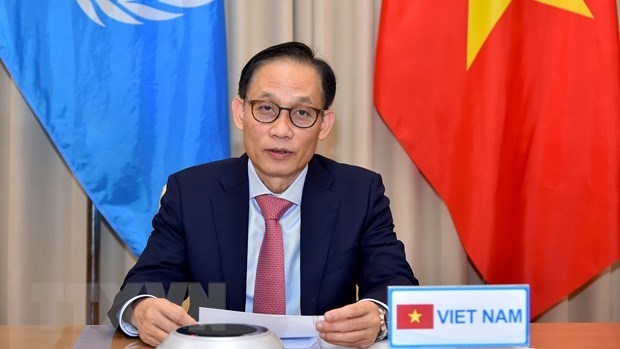Vietnam underscores adherence to UN Charter and international law
VOV.VN - Vietnamese Deputy Minister of Foreign Affairs Le Hoai Trung has underlined the necessity of fostering friendly relations among countries whilst observing the UN Charter and international law, including the 1982 UN Convention on the Law of the Sea (UNCLOS).

This comes following the international community confronting a string of major threats and challenges that ultimately stem from violations, coupled with disrespect for the core principles of the UN Charter and the UN General Assembly Resolution 2625 on “The Declaration on Principles of International Law concerning Friendly Relations and Cooperation among States.”
This was the view put forward by Deputy Minister Trung when speaking at the UNSC’s online debate on “Peacebuilding and Sustaining Peace: Contemporary Drivers of Conflict and Insecurity”, Vietnamese Deputy Minister of Foreign Affairs Le Hoai Trung has underlined the necessity of fostering friendly relations among countries whilst observing the UN Charter and international law, including the 1982 UN Convention on the Law of the Sea (UNCLOS).
He emphasized the importance of the principles set out on sovereignty equality, no use of force or threat to use force, and settlements of international disputes through peaceful and diplomatic means.
Disrespect and violations of these aspects of the UN Charter are the primary cause of tensions, confrontations, and conflicts globally, the Deputy Minister said, citing the interference into domestic affairs of states. In addition, there has been complex developments in terms of the arms race, most notably the rise of nuclear energy, with violations of the UNCLOS 1982 serving as examples.
Describing the novel coronavirus (COVID-19) as a non-traditional security challenge, the Vietnamese diplomat stated that all member states must exercise restraint in order to stop the escalation of tensions and hold dialogues as a means of seeking long-term solutions.
Furthermore, he also stressed the necessity of lifting unilateral sanctions that serve to hamper socio-economic development and the livelihoods of people living in war-torn regions.
Multilateralism must therefore be further enhanced, with the UN playing a central role in strengthening international partnerships as a means of harmonizing the interests of member states, whilst beefing up co-operation with regional organisations.
Moving forward, it can be considered vital that the UNSC make the best use of all available tools, such as preventive diplomacy, whilst striving to improve the effectiveness of peacekeeping operations, the local diplomat added.
Moreover, the UNSC must resolve the root causes of conflicts and insecurity by engaging in all stages of diplomacy, from prevention, early warnings, and to proposing solutions for conflict resolution, post-conflict recovery, and sustainable development, the Deputy Minister noted.
The nation was able to rise from the ashes of war and develop into a middle-income country, he continued. Alongside other ASEAN member states, it is striving to develop a cohesive ASEAN Community based on the principles of sharing and co-operation to create a peaceful, stable Southeast Asia and a regional environment that boasts friendship, partnership, and prosperity.
The virtual debate was presided over by Saint Vincent and the Grenadines Prime Minister Ralph Gonsalves, which holds November’s presidency, with UN Deputy Secretary-General Amina Mohammed in attendance.
